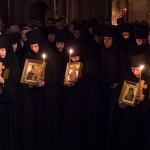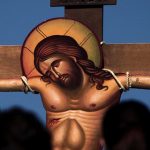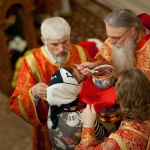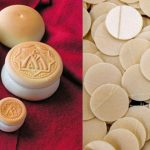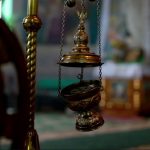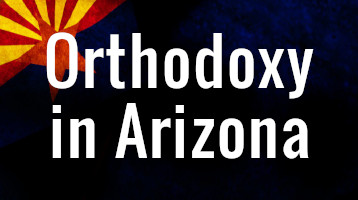Ever wonder why and how monastics receive a new name? What are the criteria for choosing names given to monks and priests? Can they influence the choice of their future names in one way or another? During this Great Lent many monastic novices became nuns, they took the monastic vows. It happened on April 15th. Several sisters took the Rassaphore and Stavrophore vows in our Convent. They were tonsured by the Most Reverend Veniamin, Metropolitan of Minsk and Zaslavl. The good tradition to perform tonsures during the Lenten season is not accidental: it’s the time when all services and prayers are designed to help us reconsider and improve our fallen way of living. We have heard the Gospel … [Read more...]
The Days Before Us: Holy Week
Each Day in Holy Week is devoted to a particular theme. Review these each day with members of your family, especially your children, during the coming week. The Beginning of the Cross Lazarus Saturday "Having fulfilled Forty Days... we ask to see the Holy Week of Thy Passion." With these words sung at Vespers, Lent comes to its end and we enter into the annual commemoration of Christ's suffering, death and Resurrection. It begins on Lazarus Saturday. The double feast of Lazarus' resurrection and the Entrance of the Lord to Jerusalem (Palm Sunday) is described in liturgical texts as the "beginning of the Cross" and is to be understood therefore, within the context of the Holy Week. … [Read more...]
During Times of Plague, Priests Do What Priests Need To Do
by Terry Mattingly The second wave of influenza in the fall of 1918 was the worst yet. By the time Father Nicola Yanney reached Wichita, Kansas, a citywide quarantine was in effect. A 16-year-old girl had already died, creating a sense of panic. The missionary priest -- his territory reached from Missouri to Colorado and from Oklahoma to North Dakota -- couldn’t even hold her funeral in the city’s new Orthodox sanctuary. As he traveled back to his home church in Kearney, Nebraska, he kept anointing the sick, hearing confessions and taking Holy Communion to those stricken by the infamous “Spanish flu.” After days of door-to-door ministry in the snow, Yanney collapsed and called his … [Read more...]
ASONA Parish Pandemic Preparedness
The CDC has called for businesses, hospitals, schools, and individuals to begin preparing to respond to a possible Coronavirus (COVID-19) outbreak and pandemic. This means churches also. Should a pandemic event occur, it would require an immediate, measured, and coordinated parish response. Our parish is small, so it will be less of a burden than it would be on larger communities. It's not a time for panic, but for careful, measured preparation. While the immediate risk of this new virus to the American public is believed to be low at this time, everyone can do their part to help us respond to this emerging public health threat. The CDC is recommending that everyone make … [Read more...]
About Closed Communion
by Abbot Tryphon Closed communion protects those who do not hold to the Church's teachings regarding the Holy Mysteries When a stranger approaches the Holy Gifts during the celebration of the Divine Liturgy it is the norm in the Orthodox Church for the priest to ask the person to "kiss the chalice". Not knowing if the person is Orthodox, or whether they are in good standing with the Church, the priest can not give them communion. This "closed communion" is not meant as a way of separating ourselves from visitors as though we were better than them, but as our way of guarding the Holy Mysteries from being received by someone who is not part of the Church and who may hold to views concerning … [Read more...]
Eucharistic Bread: Leavened or Unleavened?
In the Bible, unleavened bread is called "unleavened bread," whereas leavened bread is simply called "bread." The Jews at that time would have understood this as would have the early Christians. It says that "He took bread," meaning leavened bread; and the Christians, being first instructed by the Apostles and then reading in the Gospels some time later, implemented this. At the Mystical Supper, it is obvious that our Lord was changing things, to tie the Passover meal with its fulfillment, the Eucharist. One of those changes, obviously, was using leavened bread instead of unleavened, or at least leavened in addition to unleavened. The world was empty and devoid of grace before Christ, as is … [Read more...]
The Theological Meaning of Vespers
Great Vespers is, for many, their favorite regular service in Orthodox worship. It has great theological meaning, and as the first service at the start of the liturgical day, it has great significance. This article will enrich your experience of Vespers. The Vespers service (the first service of the liturgical day) is meant to remind us of the Old Testament period, the creation of the world, the first human beings fall into sin, of their expulsion from Paradise, their repentance and prayer for salvation, the hope of mankind in accordance with the promise of God for a Savior and ending with the fulfillment of that promise. The service begins with the opening of the Royal Doors and the … [Read more...]
